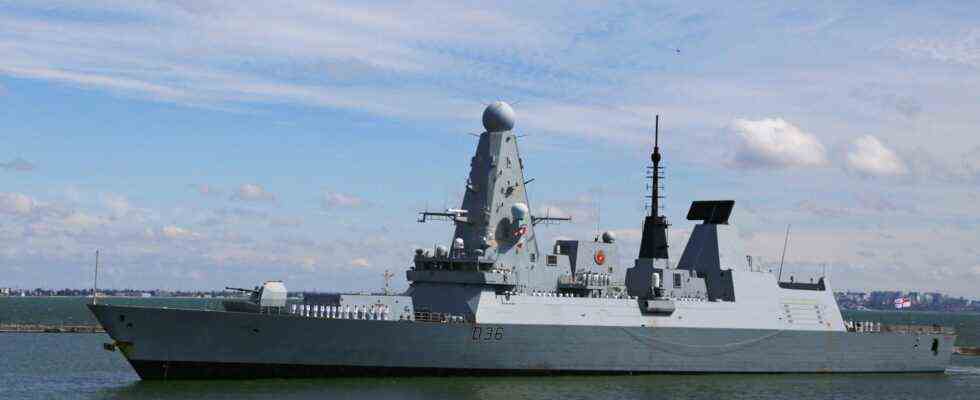analysis
Status: 25.06.2021 3:34 p.m.
Tensions appear to be rising ahead of the Sea Breeze military exercise. Experts see the trial of strength between a British warship and Russia’s armed forces near the Crimea as a calculated action that both sides consciously undertook.
From Silvia Stöber,
tagesschau.de
It looked like it would relax – US President Joe Biden’s meeting with Russian President Vladimir Putin was less than two weeks ago. Chancellor Angela Merkel and French President Emmanuel Macron proposed an EU-Russia summit – encounters on equal terms, as Putin repeatedly calls for.
However, representatives of the Russian leadership expressed themselves as if a military escalation was imminent. Defense Minister Sergei Shoigu spoke of an “explosive” situation at the start of a security conference in Moscow on Wednesday. According to Russian media reports, participants outdid themselves with criticism of the West under the motto: Whoever comes with the sword will be killed with the sword.
Schoigu mentioned “Defender Europe” – an annual series of military exercises under the leadership of the USA with NATO countries and partners. According to US data, this has now been completed on June 21. The “Sea Breeze” military exercise in the Black Sea region begins on Monday, with the USA and Ukraine as organizers. 32 states take part. That’s more than ever since “Sea Breeze” first took place in 1997. The Bundeswehr is not there.
Incident at Cape Fiolent
As if confirmation of the growing tension in the run-up to the military exercise were needed, Russian media reported an “open provocation” on Wednesday – an incident in the Black Sea: The British warship HMS Defender had entered “Russian waters off the Crimean peninsula”. With a precise time, the TASS agency described how the Black Sea Fleet and the border guards of the FSB secret service had stopped the Royal Navy ship off Cape Fiolent south of the Crimea: Warning shots were fired at 12:06 and 12:08 p.m. after radio warnings. At 12:19 p.m., bombs were dropped near the HMS Defender. Four minutes later, the ship left Russian waters.
As evidence, videos were later published from fighter jets shadowing the British ship but showing no bombing. The government called the British Defense Attaché and the Ambassador to meet with them.
The Ministry of Defense in London responded more than an hour after the incident: No warning shots were fired at the HMS Defender. The dropping of bombs is also not confirmed. It is believed that Russia carried out a target practice and warned of the activities.
For its part, the Royal Navy ship navigates Ukrainian waters in accordance with international law. The government in London made it clear that, like the majority of states worldwide, it does not recognize the Russian annexation of Crimea and Moscow’s claim to the waters before it.
The BBC correspondent Jonathan Beale reported from aboard the HMS Defender about distant shots and fighter jets over the ship, but not about bombs.
Calculable ritual
British Russia expert Mark Galeotti describes the incident not as an escalation that got out of hand, but as a ritualized challenge in which both sides were able to calculate intentions and reactions. Representatives of the Russian leadership had reacted with the well-known narrative according to which a military-industrial complex wanted to cause an escalation with Russia and demonize it – according to this narrative, Russian military policy would only be a justified reaction to an aggressive opponent.
“Brave but Risky”
Most recently, after a massive deployment of troops on the border with Ukraine, the Russian armed forces had only partially withdrawn in the spring. Units are to remain in the Black Sea until late summer, when the Sapad maneuver is held. Navy and Air Force units are currently holding exercises in the Mediterranean from Russian military bases in Syria.
Domestically, the reports from the Black Sea are apt to divert attention from the corona situation in Russia and the restrictions of politicians who are not loyal to the Kremlin and civic engagements ahead of the Duma election in September: Instead, Putin presents himself as a defender of Russia.
British Prime Minister Boris Johnson could also use a signal of military strength. In the spring he presented ambitious plans for a new foreign and security policy. The British magazine “The Economist” wrote that neither the US nor any other NATO country had yet gone so far as to send a warship with a journalist on board through the waters off the Crimea to contradict Russia’s claim to the Crimea . Britain’s move was “brave but risky”.
Other military experts in the UK, on the other hand, warned of the possible consequences of the disinformation spun around the incident. This also applies to the “Sea Breeze” military exercise that begins next week.

